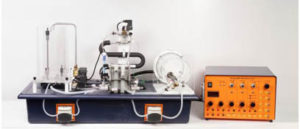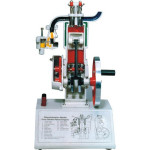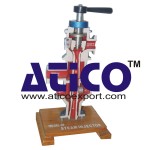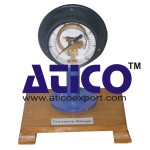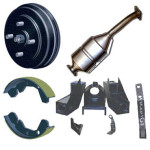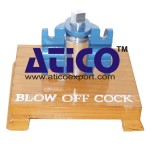Description
Process Plant Trainer
This is a benchtop process control system, comprising a process unit mounted on an ABS plinth, an electrical control console, and control software, which can be run on any Windows PC with a spare USB port.
Process Unit:
The process is modelled on an industrial high-temperature/short-time (HTST) pasteurisation process. In this process the product stream has to be kept at a predetermined temperature for a minimum time, usually for bacteriological purposes. This is effected by the use of a holding tube, which delays the product stream, thus posing particular process control problems and introducing the concept of ‘dead time’.
Other reasons why the HTST process is a particularly suitable basis for teaching process control are the use of a three-stage heat exchanger (recycle, heating and cooling) and the use of a divert valve to reject inadequately treated product. Again these important industrial principles pose real process control problems and help maintain the students’ interest.
Further process control problems are illustrated by the use of two feed tanks, with different level sensor types.
Solenoid-driven valves control the filling and emptying of these tanks. These enable different level control strategies to be developed and provide startup and shutdown operational sequencing capability.
The unit includes a wide range of instrumentation for temperature and flow measurement. It also includes a conductivity sensor, enabling simple process concentration experiments to be performed.
The Unit Comprises:
Feed system with peristaltic pump
Water heating unit with peristaltic pump
Water cooling system
Plate heat exchanger with holding tube
Flow sensor in feed line
Conductivity sensor
Four temperature sensors
Level sensor in product tank
High/low level switches in washing/reagent tank
Two-way solenoid valves for filling feed tanks and cooling water to exchanger
Three-way solenoid valves for selecting feed tank and diverting waste product
Connections to the electrical console
Control Console:
The control console provides the electrical interface and signal conditioning for the process module. It also includes a USB interface for a Windows computer. The process module sensor outputs can be displayed in engineering units on an integral LED display. The outputs are also available for external monitoring.
The drive signals to the process module can be selected as either manual control from the front panel, control from a PC via the USB bus, on/off control from an external source or analogue control from an external source. The source signals for both pumps and the heater are individually selectable.
Electrical faults may be introduced into any of the low-voltage measurement or control signals by a fault emulator installed in the electrical console. Faults may be inserted individually or in combination to suit the student’s ability. The quick-release fittings used throughout the process enable faults to be introduced into the process pipework.
The Unit Comprises:
Product feed pump speed control
Heating fluid pump speed control
Heater power measurement and control
Temperature (x4), flow, level & conductivity measurement
Digital inputs/outputs (from switches/to solenoid valves)
Simultaneous connection of all signals to 50-way IDC connector or PC via USB port
Front panel sockets for connection to accessories, in particular industrial controllers and chart recorder.
Technical Specification
Flow rate ranges: Value
Product stream: 0-480 ml/min
Washing reagent: 0-480 ml/min
Heating fluid: 0-600 ml/min
Max temperature of heating fluid: 80°C
Heat exchanger: Plate type
Feed and reagent vessel capacities: 5.7l (each)
Heating vessel capacity: 3.7l
Signal voltages: 0-5V
Level sensor range: 0-250mm
Flow sensor range: 0-500 ml/min
Temperature sensor range: 0-100°C

